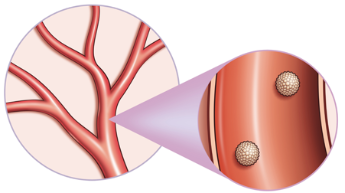Approved Use
GRANIX is a prescription medicine:
- used in adults and children 1 month of age and older with certain types of cancer (non-myeloid malignancies), who are receiving chemotherapy that affects the bone marrow
- given to help decrease the length of time that the number of certain white blood cells (neutrophils) are very low (severe neutropenia). Neutrophils are white blood cells that are important in fighting bacterial infection
It is not known if GRANIX is safe and effective in children younger than 1 month of age.
Important Safety Information
Do not take GRANIX if you have had a serious allergic reaction to filgrastim products or pegfligrastim products.
Before you receive GRANIX, tell your healthcare provider about all of your medical conditions, including if you:
- have a sickle cell disorder
- have kidney problems
- plan to have bone scans or tests
- are pregnant or plan to become pregnant. It is not known if GRANIX will harm your unborn baby. You should not become pregnant during treatment with GRANIX
- are breastfeeding or plan to breastfeed. It is not known if GRANIX passes into your breast milk. Do not breastfeed during treatment with GRANIX and for 2 weeks after the final dose.
Tell your healthcare provider about all the medicines you take, including prescription and over-the-counter medicines, vitamins, and herbal supplements.
What are the possible side effects of GRANIX?
GRANIX can cause serious side effects, including:
- Spleen rupture. Your spleen may become enlarged and can rupture. A ruptured spleen can cause death. Call your healthcare provider right away if you have pain in your left upper stomach (abdomen)-area or your left shoulder during treatment with GRANIX.
- A serious lung problem called acute respiratory distress syndrome (ARDS). Call your healthcare provider or get emergency medical help right away if you have shortness of breath with or without fever, trouble breathing, or a fast rate of breathing.
- Serious allergic reactions. GRANIX can cause serious allergic reactions. These reactions can cause a rash over your whole body, shortness of breath, wheezing, dizziness, swelling around your mouth or eyes, fast heart rate, and sweating. If you have any of these symptoms, stop using GRANIX and call your healthcare provider or get emergency help right away.
- Sickle cell crisis. You may have a serious sickle cell crisis, which could lead to death, if you have a sickle cell disorder and use GRANIX. Call your healthcare provider right away if you have symptoms of sickle cell crisis such as pain or difficulty breathing.
- Kidney injury (glomerulonephritis). GRANIX can cause kidney injury. Call your healthcare provider right away if you develop any of the following symptoms:
- swelling of your face or ankles
- blood in your urine or dark colored urine
- you urinate less than usual
- Increased white blood cell count (leukocytosis). Your healthcare provider will check your blood during treatment with GRANIX.
- Capillary Leak Syndrome. GRANIX can cause fluid to leak from blood vessels into your body’s tissues. This condition is called “Capillary Leak Syndrome” (CLS). CLS can quickly cause you to have symptoms that may become life-threatening. Get emergency medical help right away if you develop any of the following symptoms:
- swelling or puffiness and are urinating less than usual
- trouble breathing
- swelling of your stomach-area (abdomen) and feeling of fullness
- dizziness or feeling faint
- a general feeling of tiredness
- Myelodysplastic syndrome (MDS) and acute myeloid leukemia (AML). GRANIX may increase the risk of developing a precancerous condition called MDS or a type of blood cancer called AML in people who were born with low white blood cell counts (congenital neutropenia). If you have breast cancer or lung cancer, when GRANIX is used with chemotherapy and radiation therapy, or with radiation therapy only, you may have an increased risk of developing MDS or AML. Symptoms of MDS and AML may include tiredness, fever, and easy bruising or bleeding. Call your healthcare provider if you develop any of these symptoms during treatment with GRANIX.
- Inflammation of the aorta (aortitis). Inflammation of the aorta (the large blood vessel which transports blood from the heart to the body) has been reported in patients who received another filgrastim product. Symptoms may include fever, abdominal pain, feeling tired, and back pain. Call your healthcare provider if you experience these symptoms.
- Your healthcare provider may decrease your dose, temporarily stop, or permanently stop treatment with GRANIX if you have certain side effects.
The most common side effect of GRANIX is bone pain.
The most common side effects of GRANIX in children include:
- decreased platelet count
- fever
- pain in the arms and legs
- headache
- diarrhea
These are not all of the possible side effects of GRANIX.
Call your doctor for medical advice about side effects. You may report side effects to FDA at 1-800-FDA-1088.
Click here to access the full Prescribing Information for GRANIX.

